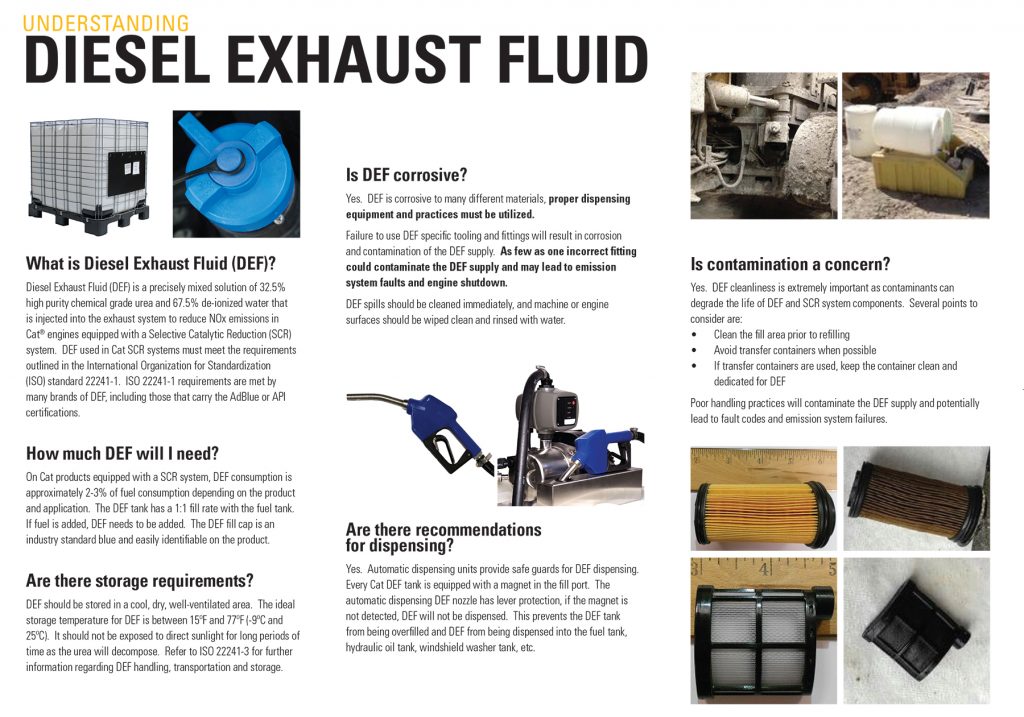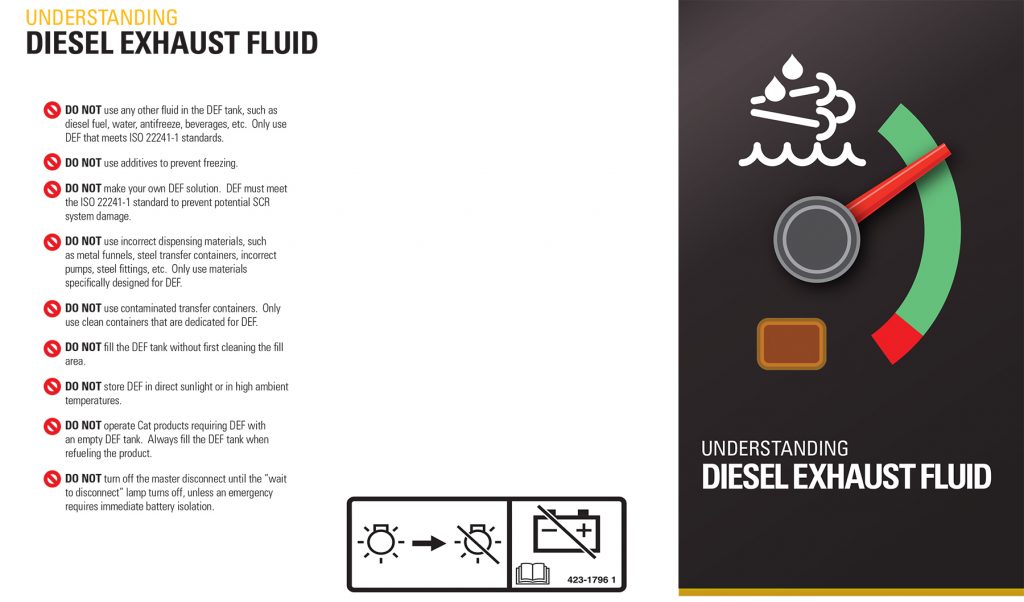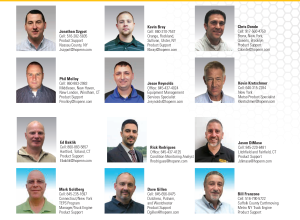Understanding Diesel Exhaust Fluid

What is Diesel Exhaust Fluid (DEF)?
Diesel Exhaust Fluid (DEF) is the reactant necessary for the Selective Catalyst Reduction System (SCR system) function. DEF is required for the proper after-treatment operation of your emissions system. It is a carefully blended aqueous urea solution of 30% high-purity urea and 70% deionized water (Specifications vary by manufacturer).
DEF used in Cat SCR Systems must meet the requirements outlined in the International Organization for Standardization (ISO) standard 22241-1.
When Do I Add DEF?
The engine needs two things to run – Diesel fuel and DEF.
So if you fill-up the DEF tank every time you fuel up your fuel tank, you’ll always be ready to go. The fuel tank and the DEF tank are sized proportionately. This means that if you start with full tanks, you’ll empty them both at about the same rate.
What if I Run Out of DEF?
There are level gauges in the cab to indicate the DEF level.
If you run out of diesel exhaust fluid (DEF), your engine will lose power, and then it will shut down. If you run out of diesel fuel or DEF, your engine will shut down.
Are There Special Storage Requirements for DEF?
DEF should be stored in a cool, dry, well-ventilated area, out of direct sunlight. The optimum storage temperature is up to 77 deg F (25 deg C).
Always refer to the manufacturer’s recommendations for storage and shelf life.
What is the Shelf Life of DEF?
The shelf life of DEF is a function of ambient storage temperature. DEF will degrade over time depending on temperature and exposure to sunlight. Expectations for shelf life as defined by ISO Spec are the minimum expectations for shelf life when stored at constant temperatures. If stored between 10 and 90 deg F, shelf life will easily be one year. If the maximum temperature does not exceed approximately 75 deg F for an extended period of time, the shelf life will be two years.
Always refer to the manufacturer’s recommendations for storage and shelf life.
What impact will exposure to high temperatures for an extended period of time have on DEF?
DEF exposure to constant, high storage temperature may impact shelf life. Extensive testing in very hot climates has confirmed that DEF stored at high temperatures will degrade.
DEF Best Practices and Tips
- DEF can freeze in cold temperatures, so when you shut off the machine, DEF is emptied out of the lines so that they don’t freeze between shifts.
- In cold weather, the DEF and the tank may freeze, but your machine has a heater in the tank. Upon startup, the DEF will be thawed out automatically.
DEF expands by approximately 7% when frozen. DEF packaging and tanks are designed to allow for expansion. - It’s very important to use the right kind of DEF. Cat equipment is designed for commercial-grade DEF that meets ISO standard 22241-1.
- Pay attention to contamination control. Start by always cleaning the DEF tank filler cap and the area around it before filling. Ensure that you are always using clean and uncontaminated DEF. Ensure you are using a clean container and funnel.
- Don’t overfill the DEF tank. DEF is corrosive to some metals and may damage the paint. Clean up any spills immediately.
Only approved materials, such as high-density polyethylene (HDPE), will be used in the DEF tank, packaging, and dispensing equipment.

Your machine’s operation and maintenance manual contains information on DEF, including contamination control and proper storage.
Remember that poor DEF quality can result in performance, aftertreatment, and operational concerns.
Contaminated DEF can lead to Costly Repairs, Operator Inducements and result in engine derate or system lockout.
For more information on the effects of DEF and the aftertreatment system refer to the previous article “E1389 – AFTERTREATMENT #1 SCR OPERATOR INDUCEMENT”
Cat® Tier 4 Final Diesel Exhaust Fluid (DEF) | Overview
We Offer Equipment Monitoring Services
Find out how Equipment Monitoring Services can decrease your downtime and reduce your Operating Costs on our EM Services page.
Contact us to request services!
Request ServiceFind Your Representative
Have questions? Your PSSR can help – Find a representative today!

